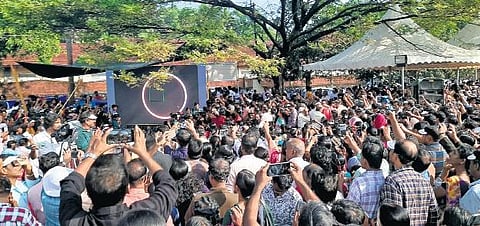

THIRUVANANTHAPURAM: Astrophiles and sky lovers in the state capital can catch a glimpse of the partial annular eclipse—‘Ring of Fire’—which will adorn the skies this Sunday. With the Covid-19 social distancing norms in place, Priyadarshini Planetarium in the city is gearing up to live-stream the eclipse on its social media handles to facilitate public viewing of the universal phenomenon. In Thiruvananthapuram, the solar eclipse would be visible from 10.38am to 1.30pm. The annular solar eclipse happens when the moon is farthest from the earth and covers the sun’s core. This causes the sun’s visible outer edge to form a ‘ring of fire’ around the moon.
According to experts, the full annular solar eclipse can be witnessed in only three states in India - Rajasthan, Haryana and Uttarakhand. “Kerala would be able to witness the celestial phenomenon partially. Unlike the last time, we will not be able to organise a mass event. So, we have decided to live-stream the occurrence so people can watch it on their phones or laptops.
Our plan is to go live 30 minutes ahead of the phenomenon with an informative session on the eclipse by an expert,” said S S Shyam, scientist at Priyadarshini Planetarium. Secretariat member of Breakthrough Science Society Rajeevan P P said that Kerala would be able to see only 35 per cent of the solar eclipse. “We are planning to organise a 3-hour long webinar on Sunday. We usually organise workshops and awareness drives to educate the public and the students on the solar eclipse.
The last time we organised an event at Central Stadium jointly with Priyadarshini Planetarium, and around 10,000 people turned up. But now it’s impossible to share a telescope with multiple people. We will be live-streaming the eclipse from different parts of the country through our webinar platform,” said Rajeevan.
Sun filter is a must for witnessing the eclipse and one should not look directly at the sun as the rays during the solar eclipse could be very damaging for the human eye. People may carry on with daily affairs otherwise.